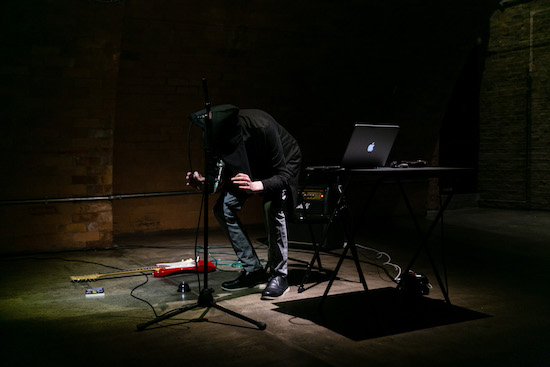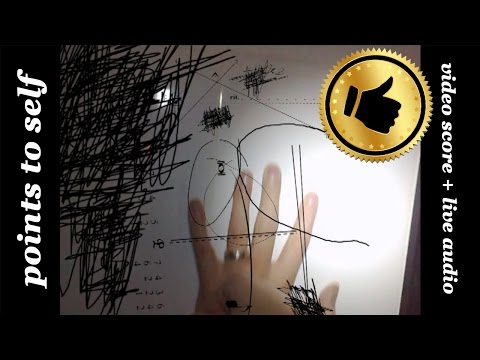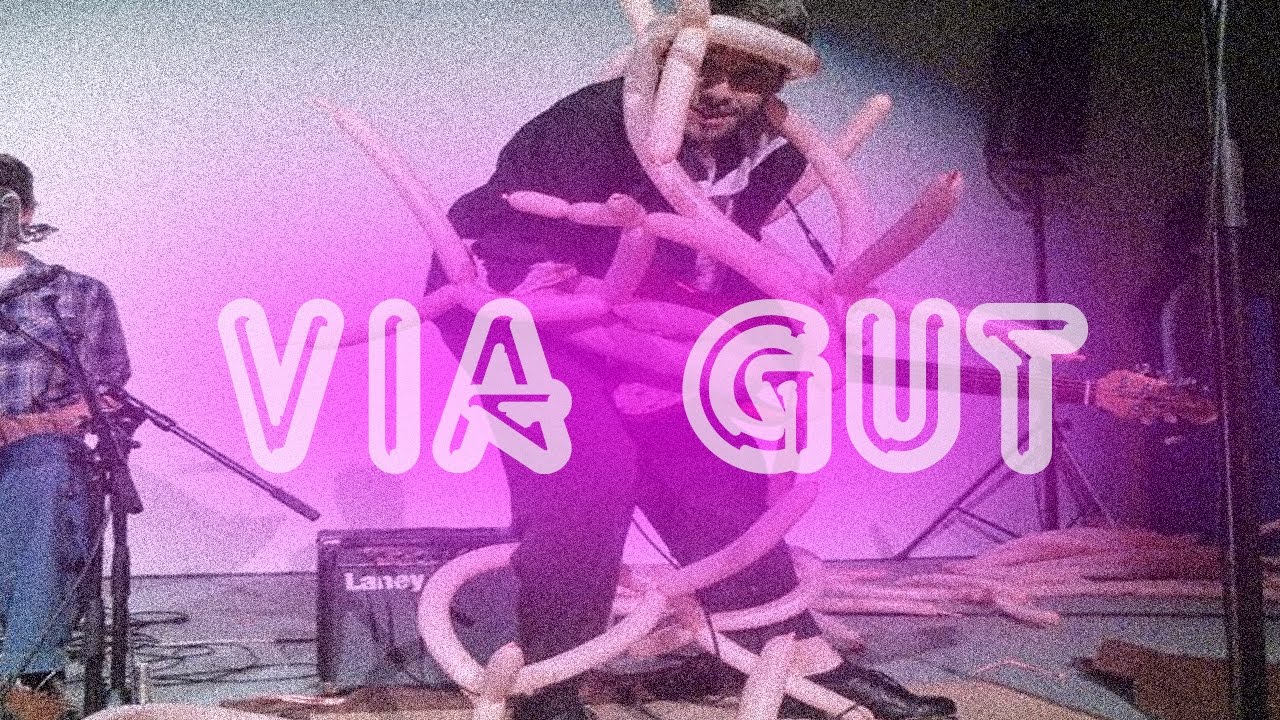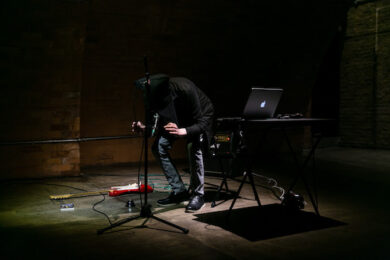Photograph courtesy of Arron Leppard
"I’ve always had quite an interest in the body and the physicality of music," Neil Luck says to me over orange juice and a cappuccino in a Soho cafe. "I used to make lots of pieces to do with physical restraints and things like that. But that interest in physicality has moved from being quite a conceptual thing to, now, I’m more interested in bringing it back to a much more mundane, everyday level."
In actual fact, that’s not quite what he said. What he really said was more like: "Yeah. Yeah, erm… Well, I’ve… Yeah, I’ve always had quite an interest in – a lot of people are interested in the – the body and the physicality of music and I’m – I’m sort of no exception [slight pause] to that [slight pause] I think. I used to make lots of pieces to do with, erm, like physical – like physical restraints and things like that. But that – that kind of interest in, like, the physicality, um, has moved from, tut, being, like, quite a – quite a sort of conceptual thing to, um, now, uh, I like foregrounding it in, uh, foregrounding it in, er, what am I trying to say? Yeah, yeah, I’m more interested in bringing it back [sharp intake of breath] to a much more mundane, everyday level."
It’s not unusual. This is how most people actually talk, but you don’t really register it. It only becomes apparent when you record a conversation and play it back, pausing to take in every detail. As a journalist, you tend to edit out all those ‘um’s and ‘ah’s and stutters and starts, just as you would quite naturally in the course of normal conversation. And, it turns out, writers aren’t the only ones who tend to elide such tics from the speech they report – composers do, too.
There are a few stutterers in the history of opera. The title role in Benjamin Britten’s Billy Budd is the example that immediately springs to mind. But the halting and uncertainty of Budd’s speech is there to say something about his character and to move the plot forward. The inherent failure – the little splutters and falters that exist in almost all speech and that, arguably, represent a constituent feature of human communication – have been, for the most part, ignored and excised by music. Until, that is, the music of composer Neil Luck.
Watching his Points To Self at the Bastard Assignments concert in Peckham the other week felt almost like witnessing the worst ever round in the Radio Four programme Just A Minute. The piece is a sort of rambling poem composed almost entirely of hesitations and deviations, interspersed with bursts of clarinet and viola from Tom Jackson and Benedict Taylor. Last December, Luck’s Via Gut, at the London Contemporary Music Festival, memorably featured a splurge of gastro-linguistic tics and belches, prompting tQ’s Leo Chadburn to compare it to "Slavoj Žižek presenting a Viz magazine-themed game show".
"I love the idea of language being this very slippery thing," Luck says. "Meanings get lost in translation – or just in me trying to explain things to you."
Born and raised in a little village in the Cotswolds, Luck started piano lessons while still at primary school. Throughout his childhood, he exhibited what he calls a magpie tendency for learning instruments: picking up the trumpet, then being forced to ditch that when he started wearing braces and switching to drums, then a few years of obsessive fingerpicking guitar study. "I don’t play any of those instruments brilliantly," he says, "but I have an understanding of how they all work."
Studying for a master’s degree at the Royal College of Music, it was the reappearance of an old friend that introduced Luck to a new way of thinking about music. Today, Sam Belinfante is a highly regarded British artist who has performed and exhibited at places such as the Whitechapel Gallery, Camden Arts Centre and Middlesbrough Institute of Modern Art. But once upon a time he played drums in a jazz-funk band with Luck while both were still at school. Luck was already one year into his course at the RCM and "pretty signed up to" its programme of mainstream contemporary classical music ("The stuff that you might hear at the Southbank," Luck explains, "that kind of vibe") when Belinfante arrived in London to study at the Slade School of Fine Art. "I started hanging out at the Slade," Luck recalls. "Suddenly it was like, oh okay! These guys are actually taught how to think."
"We were collaborating on a piece," he continues, "and I remember we had to do a class crit session. That was mind-blowing to me. Oh my god! Student peers are actually, like, criticising your work-in-progress. It’s not just an arse-kissing exercise or a polite pat on the back after a concert. They’re actually tearing you to pieces before you’ve even finished the work! I think at that point it was like, okay, maybe there’s a world beyond just writing wind quintets that get played once. From that point, that’s when my practice took a slightly different route."
In 2008 and 2009, Luck and Belinfante co-curated two exhibitions at the Slade Research Centre entitled Notations 2008 and The Voice And Nothing More, the latter named after a book by Slovenian philosopher Mladen Dolar. Both brought together artists and musicians to explore areas where the two disciplines overlapped. "He’s an artist, I’m a musician, and we were throwing our practices up in the air and seeing what happened," Luck says. Out of that collaboration came the Arco ensemble, a group of "mostly composer-performers who happen to play string instruments" who had been brought together in the process of preparing the two exhibitions.
Since then Arco have set about exploring, in their words, "alternative approaches to non-standard notation and live performance practice as a starting point for creating music theatre events characterised by a radical mix of influences from contemporary classical music, magick rituals, concrete poetry, free improvisation, slapstick comedy, kabuki theatre and Broadway show tunes". Their performances at Tate Britain, Kings Place and the National Portrait Gallery among others have involved things like retelling the story of Hercules with rock guitar riffs and classical strings mixed with references to the films of Arnold Schwarzenegger and texts spoken by Luck himself into a megaphone; a sort of pasticcio opera with music by Brian Ferneyhough, Matthew Lee Knowles and others performed by members of the ensemble taking the roles of a mime, a down-and-out and a dishevelled concert violinist; and a constantly evolving graphic score, drawn and painted by members of the public, while two improvising musicians struggle to perform it even as it’s being created.
Overlapping significantly with Arco in terms of personnel and interests is the squib-box organisation, founded by Luck with Adam de la Cour and Federico Reuben in 2010 as a record label, occasional concert series and "slightly amorphous project-based brand". Luck first met de la Cour, who is also a member of Arco, at one of the notorious Christmas parties thrown by the British Music Information Centre before it got merged with a number of other organisations under the name Sound and Music. Luck recalls de la Cour "photocopying body parts on the office photocopier and giving people piggyback rides". Later, de la Cour hooked up with Reuben on Myspace and squib-box formed from the three of them together. Whether putting out records, organising events or generally acting as a showcase for its founders’ left-field musical talents and mordant sense of humour, squib-box has been subtly improving the quality of Britain’s musical life for more than half a decade.
Through collaborations with the likes of Belinfante, Takahiro Tomatsu, and Bruce McLean – not to mention Luck’s own eclectic tastes, which include Ryan Trecartin, Hito Steyerl and Matthew Barney, alongside composers Tim Parkinson and Object Collection – squib-box and Arco have acted as conduits through which ideas from contemporary art have filtered down into the world of new music. At the same time, the presence of noted improvisers like Benedict Taylor, Tom Jackson and Dominic Lash in their pool of regular performers effects a bridge between the at-times fairly distant-seeming worlds of free improv and contemporary composition. "In a very selfish, egomaniacal way," Luck says, "the kind of performers I like – I mean, it sounds horrible – but you can sort of point at them and say, do something interesting, and they’ll do it. I never ask them to do that. It sounds horrible, dictatorial. But the potential is there."
Most recently, Luck says, he has become obsessed with a specific piece of software called Vocaloid. The speech-synthesising program, from which sprung the million-selling virtual pop star Hatsune Miku, offers unparalleled verisimilitude compared to previous MIDI-controlled voices while simultaneously being also incredibly plastic and highly manipulable in countless different ways. Somewhere in the tension between these two aspects, Luck can see possibilities for uncanny experimental effects. "It’s a very prescient idea," he says. "We’ve been doing some experiments embedding Miku into contemporary music. There’s something really exciting about the fact that Miku is actually much more virtuosic than a human singer could ever be. And there’s so much control over this software. It’s designed to be realistic, but the fact that you have so much control over the parameters makes it uncannily not-human."
From the broken, hiccupy speech of Points To Self and Via Gut to the digital smoothness of Vocaloid avatars, a productive juxtaposition clearly emerges that speaks to our ambiguous relationship with technology – and to the question of where the humanity lies in ‘normal’ human speech. "For me, it’s a natural extension of the interest in the body," Luck says. "Specifically, the quasi-human/perfect nature of it feels like a foil to my own use of the voice – fallible, pathetic, obsessed with the uncontrollable bits between language, the mistakes. That’s why I think the tech is so prescient, a reflection of our everyday corporeal engagement with technology and online media – this slick, polished surface as a distorted reflection of our own messy, flabby bodies. But then there’s still this unbridgeable aspect. It’s only ever an inch away from revealing some kind of jarring reality."
An album of Neil Luck’s choral music, performed by the experimental choir Musarc, is forthcoming on Entr’acte. He plays Bohemia Cafe in Hackney, London, on July 29; for full details and tickets, head here





